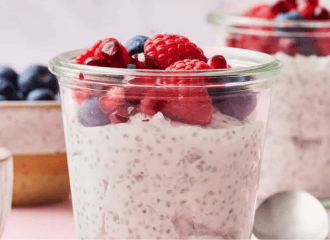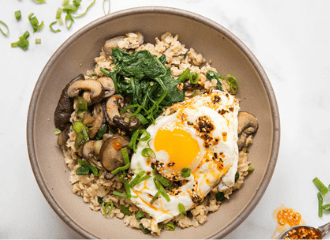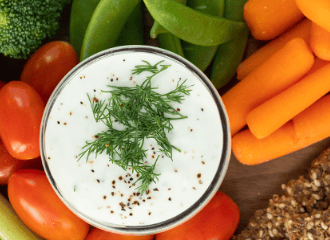- Prediabetes Mastermind
- Posts
- Is your microbiome making prediabetes harder to reverse?
Is your microbiome making prediabetes harder to reverse?
It's not just about carbs - trillions of gut bacteria could be influencing your glucose control
Welcome back, health champions!👋
If you've been frustrated because "eating less sugar" isn't solving your prediabetes, the missing piece might be hiding in your gut.
Those trillions of tiny organisms in your digestive system could be quietly influencing your blood sugar. Today we explore this promising gut-glucose connection and give you evidence-based strategies worth trying.
What's inside:
Why your gut bacteria composition might matter more than you realized
The "butyrate connection" that shows promise for blood sugar
Simple food swaps that could feed the right bacteria
Microbiome-Friendly Recipe Collection
BEST FINDS
Recipes that nurture a healthy microbiome and keep post-meal glucose in check include Chia Yogurt Parfait with kefir probiotics and fiber-rich chia, Miso-Mushroom Savory Oatmeal featuring oat β-glucan, Mediterranean Sardine Salad with omega-3s and resistant starch from cooled beans, Sesame Garlic Noodles with Tempeh using buckwheat soba and fermented tempeh, Lentil and Sauerkraut Stew combining fiber-rich lentils with live sauerkraut cultures, and Kefir Ranch Dressing that swaps buttermilk for probiotic kefir.
Gut Health & Prediabetes: The Microbiome Connection You Need to Know
Think your prediabetes is just about avoiding cookies and white bread?
If you've been reading our newsletter for a while, you know why a carb-only focus isn't just ineffective—it can work against your long-term health. Prediabetes is a metabolic system disorder that responds best to a comprehensive approach.
The 100 trillion microorganisms living in your gut appear to play a role in your blood sugar control. These tiny residents produce compounds that may either help stabilize your glucose or contribute to its fluctuations. Here's what makes this promising: your gut microbiome responds to changes faster than almost any other part of your body - meaning the strategies we're about to share are actionable steps you can start exploring today.
Recent studies show that gut bacteria may be involved in how type 2 diabetes develops, as substances produced by these bacteria can both help and hurt prediabetes progression.
Your Gut Microbiome: A Potential Metabolic Control Center
Your gut houses about 100 trillion tiny organisms—bacteria, fungi, and other microbes that work together to form your microbiome. A healthy gut microbiome consists of more than 90% of species within two main groups called Bacteroidetes and Firmicutes, with a lower ratio of Firmicutes to Bacteroidetes appearing better for health.
Think of these microbes as your body's potential metabolic workforce, constantly communicating with your organs and possibly influencing everything from inflammation to how well your body uses insulin.
Unfortunately, most people today don't have optimal gut bacteria. Studies consistently show that people with prediabetes have lower overall bacterial diversity, fewer good bacteria that produce helpful compounds called butyrate, and more potentially harmful bacteria.
When your gut bacteria are balanced, research suggests they produce potentially helpful compounds that may influence blood sugar (like butyrate, acetate, vitamins, and GLP-1), may help strengthen your gut lining to reduce inflammation, and could help your body use insulin more effectively.
When your gut bacteria get out of balance (called dysbiosis), your body may become more inflamed, which can make insulin work poorly, and you may produce fewer helpful compounds that could help control blood sugar.
The SCFA Connection: Your Gut's Potential Blood Sugar Regulators
One of the promising discoveries in gut-glucose research involves short-chain fatty acids (SCFAs)- particularly butyrate, acetate, and propionate. These compounds are produced when beneficial gut bacteria break down fiber from your diet.
SCFAs support healthy blood sugar by slowing the release of glucagon—a hormone that raises blood sugar—and helping your liver process glucose better. Higher butyrate levels are linked to better blood sugar control, but unfortunately, butyrate production appears reduced in middle-aged and older adults with prediabetes. All three circulating SCFAs were positively associated with higher GLP-1 levels, a beneficial hormone that helps control blood sugar.
When you eat a diet high in processed foods, sugar, and low in fiber, your good bacteria don't get the fiber they need to make SCFAs, harmful bacteria may take over, and SCFA production may drop dramatically.
Evidence-Based Strategies to Support Your Gut for Blood Sugar Control
The promising news is that your gut microbiome responds quickly to lifestyle changes. Here are research-backed strategies that show potential benefits for people with prediabetes:
1. Prioritize Fiber-Rich Foods
Dietary fiber is broken down by your gut bacteria, producing beneficial compounds like short-chain fatty acids. Target 25-35 grams daily from diverse sources:
Prebiotic-rich vegetables: Asparagus, leeks, onions, garlic
Resistant starches: Cooled potatoes, green bananas, oats
Legumes: Beans, lentils, chickpeas
Whole grains: Quinoa, barley, brown rice
2. Consider Targeted Probiotics
While food sources are preferred, specific probiotic strains show promise for glucose control. Include fermented foods like yogurt, kefir, sauerkraut, kimchi, and kombucha to potentially boost beneficial bacteria. Target 1-2 servings of live-culture foods daily and scan labels for "live and active cultures" with less than 6 grams sugar per serving.
3. Optimize Your Exercise Routine
Exercise appears to contribute to gut microbiome variation, with regular aerobic exercise potentially yielding improvements such as increased gut bacterial diversity and an increase in SCFA-producing bacteria.
Recommended Approach:
150 minutes weekly of moderate-intensity aerobic exercise (minimum)
2-3 strength training sessions per week
Daily movement: Even light walking after meals may improve glucose metabolism
4. Support Your Circadian Rhythms
Your gut bacteria and their helpful compounds appear to change throughout the day in natural rhythms. Late-night eating or poor sleep may disrupt these cycles and affect glucose.
Sleep Optimization:
Aim for 7-9 hours of quality sleep
Keep consistent sleep-wake times
Create a dark, cool sleeping environment
Consider anchoring meals within a 10-12 hour daytime window
5. Manage Stress Effectively
Chronic stress appears to negatively affect both gut health and blood sugar control. Stress-reduction strategies include regular meditation or mindfulness practice, yoga or tai chi, deep breathing exercises, time in nature, and social connection and support.
Foods That May Disrupt Gut Health
Certain foods appear to disrupt your gut microbiome and may worsen insulin resistance:
Ultra-processed foods: High in additives that harm beneficial bacteria
Artificial sweeteners: May alter gut bacteria composition. Stevia or monk-fruit have shown fewer adverse microbiome effects so far.
Excessive sugar: May feed harmful bacteria and promote inflammation
Trans fats: May increase inflammation and insulin resistance
Key Takeaways for Prediabetics:
Your gut microbiome influences blood sugar control, making gut support especially important. Focus on 25-35 grams of daily fiber from diverse plant sources, including onions, garlic, oats, and legumes, while combining this with exercise, quality sleep, and stress management for optimal results.
The connection between gut health and glucose control represents one of the most promising areas in diabetes prevention research. By nurturing your gut microbiome, you're taking a proactive step that may help prevent type 2 diabetes while supporting overall wellness. Your gut bacteria could be powerful allies in your health journey.
Always consult with your healthcare provider before making significant dietary changes, especially if you're taking medications for blood sugar control.

How did you like today’s newsletter? |

THAT’S A WRAP
[All original research data maintained but served with extra care ✨]
Here's to your health,
Ava
from Prediabetes Mastermind





